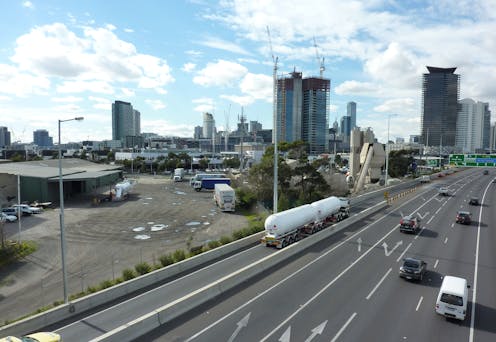stop the endless expansion and work with what our cities already have
- Written by Kate Shaw, Honorary Senior Fellow in Urban Geography and Planning, The University of Melbourne

Australian cities are good at growing – for decades their states have relied on it. The need to house more people is used to justify expansion out and up, but it is the rates, taxes and duties that flow from land transfers and construction that drive the endless development of Melbourne and Sydney in particular. Property development is the single largest contributor to Victorian[1] and New South Wales[2] government revenues.
For example, the City of Melbourne’s draft spatial plan[3] proposes new suburbs[4] to the west and north. It’s continuing on a course mapped out in the post-recession 1990s, when Australian governments focused on building on or digging up our great expanses. The plan neither questions the rationale for growth nor, apparently, the deeper effects of the pandemic.
The city council is understandably anxious to attract people back to the centre. The city plan presumes a return to Australia’s high population growth of the 2000s[5]. Expectations of a renewed influx of students, workers and tourists from overseas are based more on hope, however, than reason.
Read more: COVID halved international student numbers in Australia. The risk now is we lose future skilled workers and citizens[6]
The drivers of population growth are more uncertain and we can no longer depend on global mobility at pre-pandemic levels. Birth rates are falling across the developed world[7], online international education is improving, and research suggests pandemics will persist[8] while cities encroach on the habitats of so many other species.
Meanwhile, the towers thrown up in the heady years of growth are half-empty[9] and cracking, poorly ventilated, reliant on central air conditioning and not built for more extreme weather or low energy consumption. Melbourne and Sydney’s showcase regeneration projects at Docklands[10] and Barangaroo[11] are more dismal and deserted than ever.
Better needn’t mean bigger
Now is not the time for anyone to announce that their city will become “bigger and better[12]”. Cities don’t have to get bigger to evolve, and sooner or later all will have to reckon with the concept of degrowth[13].
Australia must become less reliant on imports of skilled workers, students, tourists and materials. We can make better use of local resources and produce much more of what we need here.
Australian cities have very good bones. They have amazing cultural scenes. Their biomedical capabilities are among the world’s best. Our education sector remains eminently exportable online and via existing overseas campuses. The manufacturing sector still has a base to build on and provide many more of the products Australians need. And our renewable energy capacity is unlimited[14].
We can support our local hospitality and cultural venues better, and increase intercity and interstate patronage. We can invest in research and development and maintain wealth through innovation and production, rather than the eternal consumption of land.
Read more: To really address climate change, Australia could make 27 times as much electricity and make it renewable[15]
Rethink what we build and why
Adapting to global environmental conditions means rethinking not just what and how we build, but why. Before designating land for yet more housing estates, for example, let’s consider that a million homes[16] – 10% of Australia’s housing stock – were empty on census night last year. Nearly 600,000 were in Victoria and New South Wales.

















